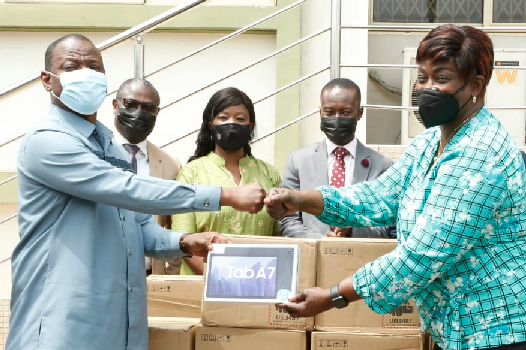
Fighting COVID-19: Tullow donates 200 data collection devices
The COVID-19 pandemic caused by SARS-CoV-2 is an important subject for global health concerns.
Ghana experienced low moderate transmission of the disease when the first case was detected in March 12, 2020 and by the middle of that month, the government ordered the close down of all schools as a way of containing the spread of the virus.
As of January 28, 2022, Ghana’s COVID-19 confirmed cases stood at 156,242, from about 2,207,069 tests conducted, while 1,364 people had lost their lives to the disease, with active cases standing at 4,185.
Viral reports have it that due to database gaps, there were initial challenges with timely reporting and feedback to stakeholders during the peak surveillance period.
The gaps resulted from mismatches between samples and their accompanying case investigation forms, samples without case investigation forms and vice versa, huge data entry requirements, and delayed test results.
With that in mind, the Ghana Health Service (GHS) on Wednesday, February 2, started a five-day national vaccination campaign as part of efforts to increase the uptake of the COVID-19 vaccine, with a clear strategy to collect accurate data to help fight the virus head-on.
The campaign intends to target at least 20 per cent of the 13.2 million population who remain unvaccinated to help achieve the herd immunity target of 20 million people.
To ensure that more than 64 per cent of the population have been vaccinated by the end of the campaign on Sunday, February 6, the GHS has deployed about 3,000 health staff across the country for the exercise in the next five days.
The health staff, as part of their mandate, need to provide real time information to the GHS database. It will not be appropriate to collect the data manually before transferring into the national database which may cause inconsistencies such as multiple entries and misinformation.
Tullow donates
It is for this reason that Tullow Ghana Limited donated 200 pieces of portable tablets worth $100,000 to the GHS to ensure that staff deployed are well resourced with modern information gathering devices.
This is a big boost to the already initiated efforts by the government to curb the spread of the disease.
The Samsung Galaxy A7 tablets are expected to help augment the information technology logistics base of the GHS by enabling it to collect real time data on national vaccination exercises.
Shared prosperity drive
Presenting the devices in Accra last Tuesday, the Deputy Managing Director of Tullow Ghana, Mrs Cynthia Lumor, said the donation was part of her outfit’s shared prosperity drive to support the government’s efforts to contain and control the impact of the pandemic.
“We are aware that data is a key requirement in the fight against the pandemic and provision of tablets will be useful in this initiative.
“And that is why Tullow Ghana is donating 200 pieces of Samsung Galaxy A7 tablets to the GHS. We believe that this will go a long way to support the vaccination campaigns”, she said.
She said the sim-enabled internet-compatible tablets come with high-capacity memory and processing chips to aid seamless and fast data gathering during the registration phase of the National COVID-19 Vaccination Days campaign and subsequent vaccination exercises that would be conducted.
She added that the fight of the pandemic required collaboration among stakeholders.
Appreciation
The Director-General of the GHS, Dr. Patrick Kuma-Aboagye, expressed gratitude to Tullow Ghana for the support provided to the GHS over the years.
He said the devices had come at an opportune time as the GHS was starting a nationwide vaccination campaign to encourage more Ghanaians to vaccinate.
“At this point, data is a crucial tool. To be able to ensure people are truly vaccinated, we need to build a strong database and these devices will help us in the process.
“This gesture will go a long way to make sure that we are able to capture the data into the GHS’s database, as we said yesterday, we are deploying about 3,000 health staff across the country for the exercise in the next five days.
“Each team will need at least one tablet and so this donation will augment the number of tablets we are deploying for the exercise. We cannot collect the data manually before transferring into the system”, he said.
He added that the GHS will ensure that the devices were used for the purpose for which they were donated.

